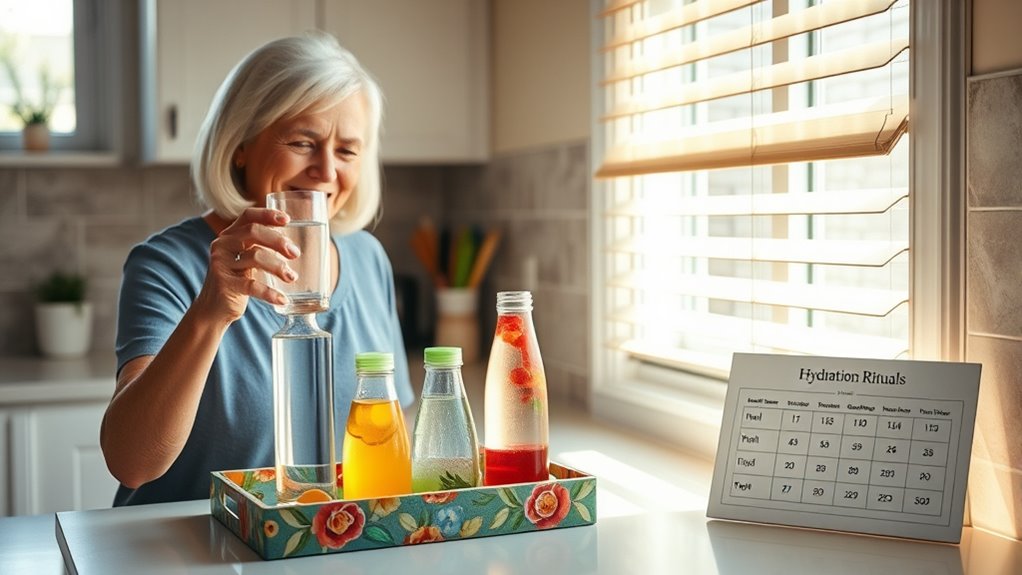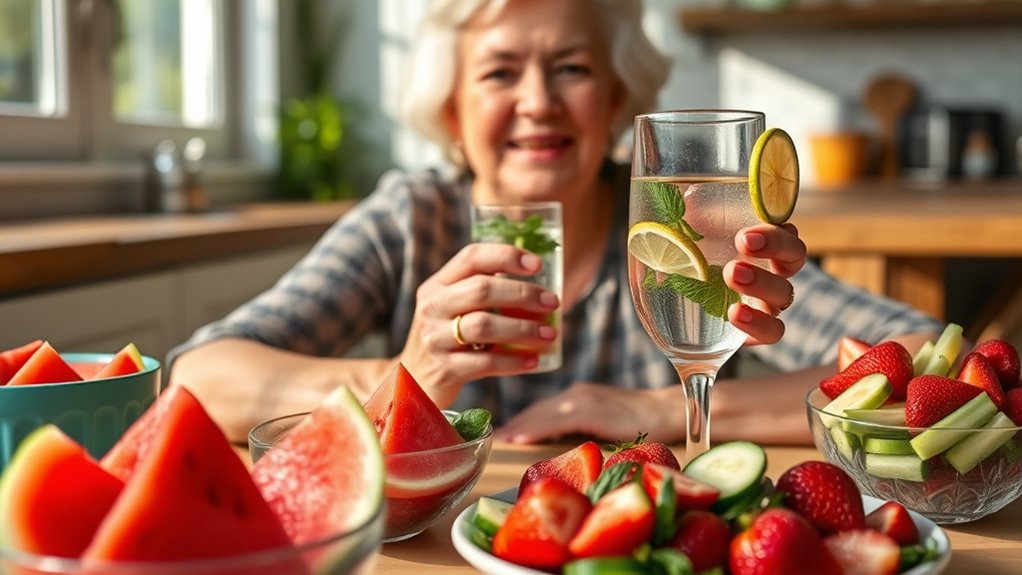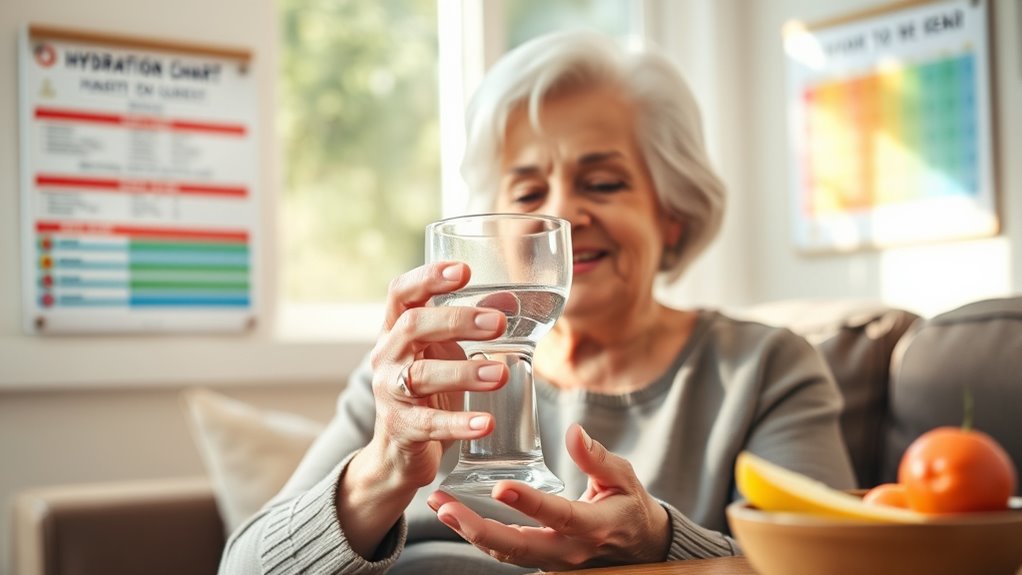To help seniors who forget to drink, make hydration enjoyable by adding infused water with fruits or herbs, and incorporate warm teas. Establish daily routines, like drinking with meals or setting reminders on devices. Keep accessible bottles nearby and use visual cues. Include hydrating foods like watermelon and cucumbers to boost fluids naturally. Monitoring intake and recognizing signs of dehydration are also essential. Continue exploring these tips to keep hydration simple and effective.
Key Takeaways
- Establish a daily hydration schedule with set times for drinking to create consistent habits.
- Keep visible, easy-to-reach containers or bottles nearby to prompt regular sipping throughout the day.
- Incorporate infused waters, teas, or hydrating foods to make fluid intake more enjoyable and appealing.
- Use visual reminders like sticky notes or digital alerts to prompt regular hydration periods.
- Monitor fluid intake with journals or apps, and watch for signs of dehydration to adjust habits promptly.
Incorporate Flavorful Beverages to Make Drinking Enjoyable

Adding flavor to beverages can make staying hydrated more appealing, especially for seniors who might find plain water boring. Infused waters are a simple way to enhance hydration—just add slices of fruit, herbs, or vegetables to water for a burst of flavor without added sugar. Flavorful teas, whether herbal, green, or black, also encourage drinking by offering a warm or invigorating alternative. These options can turn a dull routine into an enjoyable experience, making it easier to remember to sip regularly. By experimenting with different combinations, you can find beverages that suit your taste buds while boosting your fluid intake. Incorporating infused waters and flavorful teas helps make hydration a pleasurable part of your daily routine. Additionally, mindful decluttering of your beverage options can help you identify and keep only the most enjoyable and healthy choices.
Establish Consistent Drinking Rituals Throughout the Day

Creating a daily routine for drinking fluids helps guarantee you stay consistently hydrated. Establishing a hydration schedule makes it easier to remember when to drink, preventing dehydration. To stay on track, set specific times for mindful sipping, such as with meals or during breaks. Consistency helps turn hydration into a habit, so it becomes second nature rather than a chore. Keep a glass or water bottle nearby to remind yourself to drink regularly. If you stick to your routine, you’ll reduce the chances of forgetting to hydrate, especially during busy or distracted moments. Over time, these simple rituals will improve your hydration habits and support your overall health. Remember, small, consistent steps make a big difference in staying properly hydrated.
Use Visual Reminders and Technology to Prompt Hydration

Using visual reminders and technology can considerably boost your hydration efforts. Place visual cues, like sticky notes or colorful water bottles, in prominent spots to serve as constant reminders. Reminder apps on your phone can also be highly effective; set alarms or notifications to prompt you to drink water regularly. These tools help create a structured routine, especially if you tend to forget or get distracted. By integrating visual cues and digital alerts, you make hydration a priority without relying solely on memory. This approach simplifies staying consistent and ensures you don’t overlook your fluid intake throughout the day. Incorporating contrast ratio considerations into your visual cues can make reminders more noticeable and effective. Over time, these cues become habits, making hydration easier and more automatic.
Choose Hydrating Foods to Supplement Fluid Intake

Incorporating hydrating foods into your diet is an effective way to boost your fluid intake naturally. These foods not only provide hydration but also support nutrient absorption and digestive health. To maximize benefits, try adding:
Boost your hydration naturally with delicious, nutrient-rich hydrating foods like watermelon and cucumbers.
- Watermelon – high water content and easy to digest
- Cucumber – revitalizing and packed with hydration
- Strawberries – rich in antioxidants and fluids
- Lettuce and leafy greens – low in calories, high in water
Including these foods helps guarantee your body stays hydrated, especially if you forget to drink water regularly. They support digestive health by soothing the gut and improving nutrient absorption, which is essential for overall well-being. Proper toilet maintenance and choosing efficient fixtures can also help conserve water and support your hydration efforts. Making hydrating foods part of your daily meals is a simple, smart way to stay invigorated and healthy.
Make Hydration Convenient With Accessible Containers

Having hydrating foods on hand is helpful, but making sure you can easily access fluids throughout the day makes a bigger difference. Keep reusable bottles within reach, so you can sip water whenever you feel thirsty. Fill them with fresh, appealing drinks and place them in visible spots around your home. Easy access cups are also essential; use lightweight, spill-proof containers that encourage regular drinking. Keep a few in different rooms or near your favorite chair to remind you to hydrate frequently. Avoid complicated lids or containers that require effort to open. Simplifying your hydration routine makes it more likely you’ll remember to drink consistently, reducing the risk of dehydration and keeping you healthier and more energized throughout the day. Incorporate accessible containers designed for seniors to further enhance your hydration habits.
Monitor Intake and Recognize Signs of Dehydration

Monitoring your fluid intake is essential because it helps you guarantee you’re drinking enough throughout the day. Keep track of your daily fluid intake to prevent dehydration. Recognizing dehydration symptoms early can make a big difference. Here are four key points to contemplate:
Tracking your daily fluid intake helps prevent dehydration and keeps you feeling your best.
- Use a journal or app to log every drink you consume.
- Aim for consistent fluid intake, even if you don’t feel thirsty.
- Watch for dehydration symptoms like dry mouth, dark urine, dizziness, or fatigue.
- Adjust your drinking habits if you notice any signs of dehydration.
- Incorporating AI in Business tools can help you monitor hydration patterns more effectively.
Frequently Asked Questions
How Can Family Members Encourage Seniors to Drink More Regularly?
You can encourage seniors to drink more regularly by setting up hydration tracking and giving gentle family reminders throughout the day. Use a visible water schedule or apps to help them stay aware of their intake. Consistently reminding them and making water easily accessible makes it easier for seniors to remember to hydrate. Your support and routine can substantially improve their hydration habits and overall health.
Are There Specific Beverages Senior-Friendly for Hydration Purposes?
You might think plain water’s enough, but flavored water and herbal teas are great senior-friendly options. These beverages add variety, making hydration more appealing, especially if seniors find plain water boring. Herbal teas provide warmth and comfort, while flavored water offers a subtle taste without added sugar. Together, they create a balanced mix that encourages regular drinking, helping seniors stay hydrated while enjoying their favorite flavors.
What Are the Risks of Overhydration in Seniors?
Overhydration in seniors can disrupt electrolyte balance, leading to symptoms like confusion, nausea, and muscle weakness. It’s essential you monitor hydration carefully to avoid drinking too much, which can strain your kidneys and cause hyponatremia. Regular hydration monitoring helps you maintain a proper fluid intake, ensuring you stay balanced and healthy. Pay attention to thirst cues and consult healthcare providers if you notice any unusual symptoms.
How Do Medication Side Effects Influence Hydration Needs?
Medication side effects can considerably influence your hydration needs through interactions that cause dehydration or fluid retention. Some medications act as diuretics, increasing fluid loss, while others may make you feel thirsty or cause dry mouth. To stay safe, you should monitor your hydration closely and communicate with your healthcare provider about any symptoms. Being aware of medication interactions helps you maintain proper hydration and avoid complications.
Can Dehydration Impact Cognitive Health in Seniors?
They say, “An ounce of prevention is worth a pound of cure,” and this applies to dehydration’s impact on your cognitive health. When you don’t drink enough water, you risk brain fog and electrolyte imbalance, which can impair memory and focus. Staying hydrated helps maintain your brain’s function and reduces these risks. Even if you forget, make a habit of drinking regularly to protect your mental clarity and overall well-being.
Conclusion
Staying hydrated might seem simple, but it’s essential for your health—think of water as your body’s fuel. By incorporating flavorful drinks, setting reminders, and choosing hydrating foods, you turn hydration into a manageable part of your day. Remember, neglecting your thirst is like ignoring a gentle whisper from your body—soon, it may shout. So, take charge, make hydration enjoyable, and let your body’s needs be your guiding light to feeling your best.









